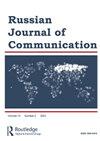Communication, democracy, and intelligentsia
Q1 Social Sciences
引用次数: 1
Abstract
In the early 1990s, a group of Russian and American scholars teamed up to investigate the impact of Gorbachev’s reform on Soviet society, focusing especially on the role the intelligentsia played in fomenting glasnost and perestroika. Results of this collaborative study were published in a volume Russian Culture at the Crossroads: Paradoxes of Postcommunist Consciousness (Shalin, 1996a). The contributors worked on the assumption that perestroika was an irreversible achievement, that distortions the reforms wrought in Russian society would be smoothed out over time. Today, this assumption appears overoptimistic. After nearly twenty years in power, Vladimir Putin dismantled key democratic institutions, badly weakened other, and established a personalistic regime that reversed many political gains brought about by his predecessors. An international team assembled for the present project starts with the premise that we live in the age of counterperestroika. Our focus is still on the intelligentsia and its contribution to dismantling the Soviet system, but now we want to explore the unanticipated consequences of social change threatening the existence of the intelligentsia as a distinct group. Our team includes prominent scholars, writers, and civil rights leaders who illuminate the political agendas and personal choices confronting intellectuals in today’s Russia. Contributors look at the current trends through different lenses, they disagree about the intelligentsia’s past achievements and looming future, yet they all feel the need to examine its local and world-historical significance. This essay aims to place the debate in historical context and elucidate its relevance to the field of communication studies. I begin with the communication-specific conditions fortifying democratic institutions and show how distorted communications have hobbled the Russian intelligentsia throughout history. Next, I review the social context within which the intelligentsia emerged, the special place it occupies in Russian discourse, and the acute distress counterperestroika inflicted on Russian society in general and public intellectuals in particular. After examining the systematic distortions that communication suffers in repressive societies, I zero in on the intelligentsia’s role in modeling emotionally intelligent conduct and scrutinize the communication sphere as the condition of possibility for a viable democracy. I close this introduction with a brief survey of the articles collected in this volume and reflections on the prospects for a communication theory in the pragmatist key.沟通、民主和知识分子
上世纪90年代初,一群俄罗斯和美国学者合作调查戈尔巴乔夫的改革对苏联社会的影响,特别关注知识分子在煽动开放和改革方面所起的作用。这项合作研究的结果发表在《十字路口的俄罗斯文化:后共产主义意识的悖论》一书中(沙林出版社,1996a)。作者的假设是,改革是一项不可逆转的成就,改革对俄罗斯社会造成的扭曲将随着时间的推移而得到消除。如今,这种假设似乎过于乐观了。在执政近20年后,弗拉基米尔·普京(Vladimir Putin)废除了关键的民主制度,严重削弱了其他民主制度,建立了一个个人主义政权,逆转了他的前任带来的许多政治成果。为本项目组建的国际团队以我们生活在反改革时代的前提开始。我们的重点仍然是知识分子及其对解体苏联制度的贡献,但现在我们想探讨威胁到知识分子作为一个独特群体存在的社会变革的意想不到的后果。我们的团队包括杰出的学者、作家和民权领袖,他们阐明了当今俄罗斯知识分子面临的政治议程和个人选择。作者们从不同的角度看待当前的趋势,他们对知识分子过去的成就和即将到来的未来看法不一,但他们都认为有必要审视其在当地和世界历史上的意义。本文旨在将辩论置于历史背景中,并阐明其与传播学领域的相关性。我从加强民主制度的特定通信条件开始,并展示了扭曲的通信在历史上是如何阻碍俄罗斯知识分子的。接下来,我回顾了知识分子出现的社会背景,它在俄罗斯话语中占据的特殊地位,以及反改革对俄罗斯社会,特别是公共知识分子造成的严重痛苦。在考察了压制性社会中沟通所遭受的系统性扭曲之后,我将注意力集中在知识分子在塑造情商行为方面的作用上,并将沟通领域作为可行民主的可能性条件进行了仔细研究。在引言的最后,我对本卷中收录的文章进行了简要的综述,并对语用主义语境下交际理论的前景进行了思考。
本文章由计算机程序翻译,如有差异,请以英文原文为准。
求助全文
约1分钟内获得全文
求助全文
来源期刊

Russian Journal of Communication
Social Sciences-Political Science and International Relations
自引率
0.00%
发文量
0
期刊介绍:
Russian Journal of Communication (RJC) is an international peer-reviewed academic publication devoted to studies of communication in, with, and about Russia and Russian-speaking communities around the world. RJC welcomes both humanistic and social scientific scholarly approaches to communication, which is broadly construed to include mediated information as well as face-to-face interactions. RJC seeks papers and book reviews on topics including philosophy of communication, traditional and new media, film, literature, rhetoric, journalism, information-communication technologies, cultural practices, organizational and group dynamics, interpersonal communication, communication in instructional contexts, advertising, public relations, political campaigns, legal proceedings, environmental and health matters, and communication policy.
 求助内容:
求助内容: 应助结果提醒方式:
应助结果提醒方式:


